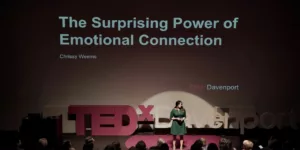Entrepreneurs are increasingly using emotional marketing to influence buyer decisions and create meaningful relationships. One of the most effective strategies is telling stories in a manner that connects with the audience. According to Small Business Trends, emotion is the most critical factor when it comes to great customer experience. Emotions can create a positive brand experience, which helps boost sales and customer loyalty. In a survey, 37% of consumers and 26% of businesses rated satisfaction as the most important form of emotional expression.
Satisfaction ranks high because it reflects a positive brand experience. The other important sets of emotions in the business context are feeling safe or reassured; feeling relaxed and being made to feel important. From the SmallBizTrend report, negative brand experience is often typified by a bad experience, frustration, and disrespect. All these feelings can drive a wedge and push customers away from a brand. Entrepreneurs can seize the moment and make an emotional connection with customers by implementing the following tested business strategies:
• Delivering on promises – the differences in consumer feeling and business priorities often creates a communication rift that impedes the delivery of promises. Businesses that want to boost emotional connection must first deliver on the promises they give. To further bridge the divide, entrepreneurs need to make clients feel part and parcel of the brand.
• Creating personalized interactions – personalized interaction has a way of building attachment and trust. In some jurisdictions, this form of interaction is rated higher than traditional target advertising, which is usually devoid of personal attachment. Businesses can make the most from personalized interaction by gathering vital data about consumers and use the information to improve customer approach and overall user experience.
• Carrying out regular surveys – entrepreneurs can easily find out if customers are satisfied with their brand or offerings by carrying out regular surveys. Besides knowing how the business is performing on the emotional front, the responses obtained from the survey can be used to better understand the audience and make improvements in areas where weaknesses are reported.
How to make emotional marketing work for your brand
To turn casual consumers into real brand believers, the emotional marketing strategy must be grounded on a solid foundation. According to the Entrepreneur magazine, the approach should be inspirational, aspirational and localized. When thinking of inspiration, entrepreneurs need to find things that motivate consumers. Customers can easily be inspired by human interest stories. Companies can also appoint personalities who embody the brand to reach out to the masses.
A company can also look outward by choosing accomplished athletes, entertainers and other role models to play the role of brand ambassadors. By tapping into the audience’s dreams, entrepreneurs can use customer aspiration to build a solid brand presence. The plan is to create a compelling story that matches a brand’s desire with the aspirations of the target audience.
A localized approach is also important in the emotional marketing schematic.
The strategy works by exploring people’s pride and passion-based on where they reside. Brands can appeal to the client’s emotions by attaching popular local attractions like monuments, colleges and the home teams into their marketing strategies. Businesses can also sponsor local events or partner with the local communities to address issues close to people’s hearts. An effective emotional marketing strategy should also incorporate, express love and celebrate milestones.
Expressing love in extraordinary ways can turn a less known enterprise into a big brand that people can relate to. If a brand can show people how much it cares, people’s perception of the brand can easily change for the better. Successful companies often celebrate milestones as a strategy to strengthen their relationship with customers. A company that has turned 40 years can use the milestone to remind the audience how they have benefited the community.
The Chrissy Weems Inspirational Story About Emotional Connection
Chrissy Weems and daughter Bella Weems have built an entire business by connecting with customers emotionally. Chrissy is the CEO of Origami, a fast-growing jewelry enterprise that sells charms and embellishments tailor-made for lockets. The charms are expressly selected by customers and carry different personal meanings. In one of the memorable occasion, a customer picked a design with 2 sunflowers in remembrance of her twin daughters who passed on. Chrissy Weems recently shared her captivating story at a TED event held in Davenport, Iowa.
She confessed that the idea to start the business came from Bella Weems, her teenage daughter. It all started when Bella set out to buy a car, but couldn’t raise sufficient funds from the babysitting work she was doing. To achieve her target, she proposed to start a business and Origami Owl was born. The business grew rapidly with the support of the direct selling model and social sellers. The success of the business venture helped Bella Weems buy the jeep she had coveted at the tender age of 16. Origami owl also expanded its reach across the country.
The success drew the interest of several investors who chimed in with cash offers and buyout proposals. Because of her personal conviction, Chrissy decided to return the investor’s fund. The decision initially affected the business cash flow, but the troubles were short-lived. Chrissy has vowed to continue creating pieces of jewelry as part of her commitment to strengthening the bond between friends and families. From her personal experience, any business that wants to succeed in today’s competitive marketplace must make an effort to improve emotional connection.








